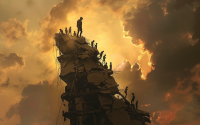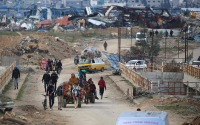13 April 2004
The road from Lagos to Benin City in the east is, even by Third World standards, a nightmare of lethal driving and gigantic potholes, some of them deep enough to sink a bus. The tarmac - what's left of it - is crazily cracked.
As we career along in the West African heat and dust it's difficult to predict the next hazard. By the side of the dual-carriageway, and all along the central reservation, lie the burnt-out remains of countless lorries and mini-vans. They may be the victims of long-forgotten accidents or hijackings, or simply vehicles which immolated through heat and neglect. All the saleable parts have long been removed.
We bump along, protected by an armed guard. From time to time, our driver swerves through the litter on the central reservation into the traffic coming straight towards us. After the third lethal swerve, approaching the brow of a hill, our leader shouts to the driver to cool it - we'd rather negotiate the potholes on our side of the road than deal with the cowboys rocketing towards us on the other. We are already two hours late for our next appointment, but we'd like to get there alive.
We're driving through Nigeria's bandit country. Hijacking cars and minibuses and cannibalising them for parts is kids' stuff: further on, in Port Harcourt, underwater thieves will quietly remove the propellors off ships. In Nigeria, anything can be stolen, and anything can be sold, including human beings.
Nigeria is not Africa's biggest country, but it is its most populous. One in six Africans is a Nigerian: 126 million people live in a country which is a federation of states, politically and religiously divided between the Muslim north and the predominantly Christian south. It should be a rich country, by African standards, for it is well endowed with oil and gas, its climate is good for agriculture, and its people are famously ingenious. But the oil boom of the Seventies was followed by a slump, and conditions in Nigeria were made worse by years of military rule and economic mismanagement under General Sani Abacha, who is rumoured to have stashed around $3bn in European banks. With the deterioration of basic services, ethnic clashes increased, and with the instability so did child neglect and sexual abuse. President Olusegun Obasanjo has headed a civilian and democratic government for five years, but his country's human rights problems seem as formidable as ever.
Each year, more than 200,000 Nigerian children are forcibly taken from their homes to be put to work. Some go with the permission of their parents, and some do not. Many, especially boys who may be as young as five or six, end up as household slaves far from home, or as agricultural workers on smallholdings or in quarries, where they break large lumps of granite with heavy iron hammers and earn little more than a few cents a day. The dust they inhale will do them lasting damage. Some, especially the younger ones, die as a result; others end up with terrible scars, both physical and psychological.
The girls who are taken may end up in domestic service, but many become prostitutes, perhaps in Ivory Coast or Gabon, but increasingly in Europe, particularly in Italy, where a well-organised criminal network distributes them to major cities like Rome, Florence and Turin. A few escape: since the agreement forged between the Italian government and that of Nigeria last year, around 200 Nigerian girls a month are returned home.
Many of them are waiting to be processed out of Italy at a holding camp near Rome, but there is no rehabilitation centre for the girls when they return: only the remand homes to which girls arrested locally are sent. Many of them, presumably, especially if their families reject them, go back on the game.
The trafficking business is a serious money-spinner for the gangs that run it, and is worth, according to estimates by the United Nations children's fund (Unicef), around £5bn a year. The Nigerian government, though its laws against trafficking are arguably stronger than those currently operating in the UK, has yet to deal seriously with its consequences, and generally relies on charities like Unicef to set up or support prevention or containment schemes. Through it, I met some of the girls who have managed to free themselves from the clutches of both the traffickers and the powerful "native doctors", or "voodoo priests".
Esther, now 18, was 15 when she was taken from her village in the hinterland of Benin City. She appears still to be traumatised by her experience, and speaks slowly. Before she left, the local voodoo priest put a curse on her, with the help of some of Esther's own nail clippings and body hair. This was so that she would never reveal the names of her traffickers to the police.
"He had a female helper," she told me "who took strands of my hair and kept them". It appears her mother did nothing to stop this. Esther and a schoolmate ended up in Mali, living in a "hotel" owned by a local woman who regularly puts Nigerian girls to work as roadside prostitutes. Esther was at first too frightened to run away, but was arrested for soliciting and was subsequently brought home with the help of a charity started by the wife of the governor of her home state. She is one of the comparatively lucky ones - she is now being helped by a counselling and training centre for abused girls.
Melody, now in her early twenties, was taken by traffickers to Turin, in Italy, where an older woman she knew from her school in Benin City - "my school mother", she told me - had promised her a place in a college. "But she deceived me." Melody found herself trapped in the woman's house, and was beaten daily when she refused to go on the streets. The woman demanded increasingly large sums of money for her air fare. Rescue came after Melody, too, was arrested by local police and deported.
Nigeria has porous borders and there are rich pickings for the well organised trafficking businesses: youngsters are transported both in and out of the country, to and from neighbouring Mali, Togo, Gabon and the Ivory Coast, and also trafficked within Nigeria itself. The local custom of sending children from rural backgrounds to be fostered in big cities has been a boon to the traffickers. So has the malevolent influence, even among practising Christians, of the witch doctor, who can only too-easily frighten children into servitude and silence.
Rita, now a smartly-dressed 21-year-old, was 17 when people, calling themselves her sponsors, promised that they would take her to Europe to improve her education. She ended up travelling with 10 other girls overland to Gabon. She seemed condemned to years of prostitution, especially after a local witch doctor made her drink a bitter mixture of chicken hearts and local gin and swear that she would pay back her sponsors a vast sum of money - so enormous at £25,000 that it would be almost impossible for her to earn. With five other trafficked girls, she managed to escape the brothel in Gabon by stowing away aboard a ship heading back to Nigeria. What happened when she arrived home? "My mother threw me out," she said, "as I had brought no money with me". Now Rita, too, is being helped to finish her schooling by sympathetic locals in Benin City. She hopes to study for a science degree.
The Odo family in the hinterland of Enugu - the girls range from 17-year-old Chinwe to solemn little Obianuju, aged eight - has an even sadder tale to tell. The four sisters and their brother Nanyere, now 13, were orphaned two years ago. The graves of their parents are marked by two neat circles of stones next to one of the huts. They live in extreme poverty in what, from a distance, looks like an enchanting rural African scene - two neat thatched huts, set in a forest clearing. Neighbours own a goat and a couple of chickens, but the Odo girls have nothing. In a quiet voice, and with great dignity, Chinwe told me how they survived: by collecting palm nuts in the dry season, some of which they eat. They pound the rest into a pulp which yields palm oil, which they can sell in the local market. The large pile we saw on the beaten earth outside her hut might earn just over £1. In the rainy season, which is about to begin in Nigeria, the forest will also produce herbs, grasses, wild fruit and even snails which they can eat - and sell.
The girls walk an hour to school every day. The nearest supply of water is 15 minutes away, and has to be brought, African-style, in containers carried gracefully on the girls' heads. A further tragedy has hit the orphaned family since the death of their parents. They have lost their brother Nanyere, aged 15, to the traffickers. A man calling himself Christopher, a "businessman", tipped off that the Odos were alone, came one day to the village and told them he could find work for Nanyere in faraway Kano, in Nigeria's north. He took Nanyere away, and his sisters have heard nothing from him since. He has probably been sold into domestic slavery in Kano, and is living in terrible conditions. They have little hope of seeing him again.
But there are small shafts of light at the end of this very murky tunnel. The problem of trafficking is now, at last, being openly discussed by some of the most vulnerable people in Nigeria, which was not the case a few years ago. Along the terrifying highways, next to messages about the dangers of HIV and Aids, you will see billboards with urgent messages: "Trafficking in Women and Girls is Inhuman. Steer Clear of it". Enlightened primary schools encourage rural children to deal with the subject by writing and performing little plays which point out its dangers. Shortly before we left the country, I took part in a radio show, broadcast by Radio Nigeria, with Unicef UK's president, Lord Puttnam, on which we discussed child trafficking with a bright group of youngsters, aged from 10 to early teens, who showed remarkable awareness of the problem and no embarrassment at all at discussing its seamier side.
Across the country, organisations have been set up, some by charities and some by inspired individuals, which counsel youngsters who have suffered and survived. We met a determined expatriate British woman, Marion Sikuade, who is married to a Nigerian and whose Child Life-Line programme gives accommodation, security and education to 24 boys abandoned by their families. One of them, Sunday Akimleye, told me he had lived on the streets between the ages of eight and 11. He is now an apprentice in a small furniture factory.
In Britain, the Asylum and Immigration Bill, which is about to pass into law, makes all human trafficking illegal - Unicef would like there to be a distinction between the trafficking of adults and of children. The Metropolitan Police will soon produce a report on their own monitoring of children at risk coming in to Britain. One woman, Lynne Chitty, has just opened a safe house in West Sussex - the first in Britain for women trafficked here from West Africa - helping girls petrified of breaking the black magic oath to feel secure enough to break away from the hold of the voodoo priests.
All these are positive moves. The Prime Minister has launched a special commission on Africa. We can only hope the great and the good find time, as they talk about granting aid and relieving poverty, to deal with one of Africa's most heartbreaking issues: the buying and selling of children.
Sue MacGregor travelled to Nigeria with Unicef UK
http://news.independent.co.uk/world/africa/story.jsp?story=510932






